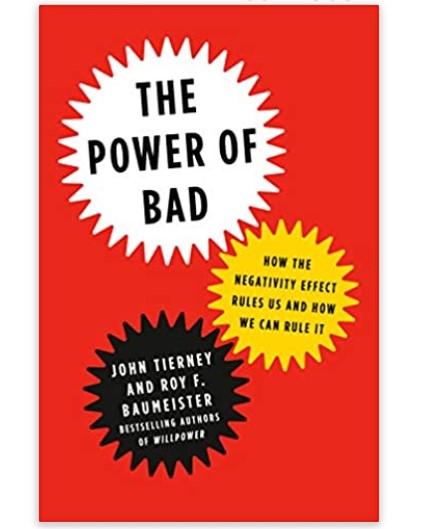The Power of Bad
Even though a single bad event is stronger than a series of good events, going through the bad stuff can better prepare you for life’s many challenges.

Capital Thinking • Issue #600 • View online
“A spoonful of tar can spoil a barrel of honey, but a spoonful of honey does nothing for a barrel of tar.” – Old Russian Saying
Why Bad is Stronger Than Good (There is No Opposite of Trauma)
Ben Carlson | A Wealth of Common Sense:
In his heyday, David Letterman was a celebrity to celebrities.
Every comedian on the planet has a podcast now and the ones from a specific era mention making it on the Letterman show as their sole goal in life when they got into the business.
Jay Leno may have had better ratings but Letterman had juice with other celebs. They worshipped Dave.
Despite the undying adoration of his peers, Letterman was still human.
When he was winding down his late-night show a few years ago, Dave admitted the bad times stuck with him more than the good times, confessing, “Maybe life is the hard way, I don’t know. When the show was great, it was never as enjoyable as the misery of the show being bad. Is that human nature?”
With this simple statement, Letterman summed up decades of research in behavioral psychology.
The bad stuff always sticks with us more than the good stuff. Losses make us feel worse than gains make us feel good.
Your favorite team losing at the buzzer will stay with you for a lifetime while the feeling from winning a championship eventually wears off.
Bad is stronger than good.
This is not just anecdotal. Psychologists and behavioral economists have been studying this idea for years.
Research shows the following:
Disliking trumps liking. One study found living near other people increased the likelihood two people would become enemies more strongly than it predicted the likelihood they would become friends.
I’m guessing the quarantine is putting many relationships inside the home to this test as well.
Negative events are covered more than positive events. This is obvious every time you turn on the news but holds for academic research too.
A research paper in the 1980s looked at more than 17,000 articles from psychology journals, finding the negative issues received roughly 70% of the coverage while positive research got just 30% of the attention.
Even the researchers of this stuff care more about bad than good.
Bad reputations are easier to acquire than good reputations. Warren Buffett once said, “It takes 20 years to build a reputation and 5 minutes to ruin it.”
A bad reputation can stick with you for a lifetime while good reputations can be ruined with a single act.
Bad events take longer to wear off than good ones. A famous study from the 1970s interviewed 3 groups of people: (1) lottery winners, (2) people who were paralyzed in an accident and (3) people who hadn’t experienced a life-changing event like this.
They then waited a year or so before interviewing the lottery winners and accident victims.
When quantifying the happiness of the 3 groups, the lottery winners were no happier than the other participants.
The euphoria of winning the lottery didn’t last and ironically, these people reported finding more areas of unhappiness from the reduction in the enjoyment of life’s little pleasures.
The best summation of this research comes from a paper called Bad is Stronger Than Good by Roy Baumeister, Ellen Bratslavsky, Catrin Finkenaurer and Kathleen Vohs.
As with most things in behavioral psychology, the explanation for these feelings come from our ancestors:
From our perspective, it is evolutionarily adaptive for bad to be stronger than good.
We believe that throughout our evolutionary history, organisms that were better attuned to bad things would have been more likely to survive threats and, consequently, would have increased probability of passing along their genes.
As an example, consider the implications of foregoing options or ignoring certain possible outcomes.
A person who ignores the possibility of a positive outcome may later experience significant regret at having missed an opportunity for pleasure or advancement, but nothing directly terrible is likely to result.
In contrast, a person who ignores danger (the possibility of a bad outcome) even once may end up maimed or dead.
Survival requires urgent attention to possible bad outcomes, but it is less urgent with regard to good ones.
Hence, it would be adaptive to be psychologically designed to respond to bad more strongly than good.
This is the double-edged sword of human nature. Many of our emotions, instincts, and ingrained behaviors have helped our species survive for tens of thousands of years.
But they can also make our lives more difficult in the modern era where tiger attacks are not our most pressing danger.
Baumeister wrote a book on his findings with John Tierney called The Power of Bad. The authors discuss the fact that there is no opposite of trauma:

*Featured post photo by Sharon McCutcheon on Unsplash
